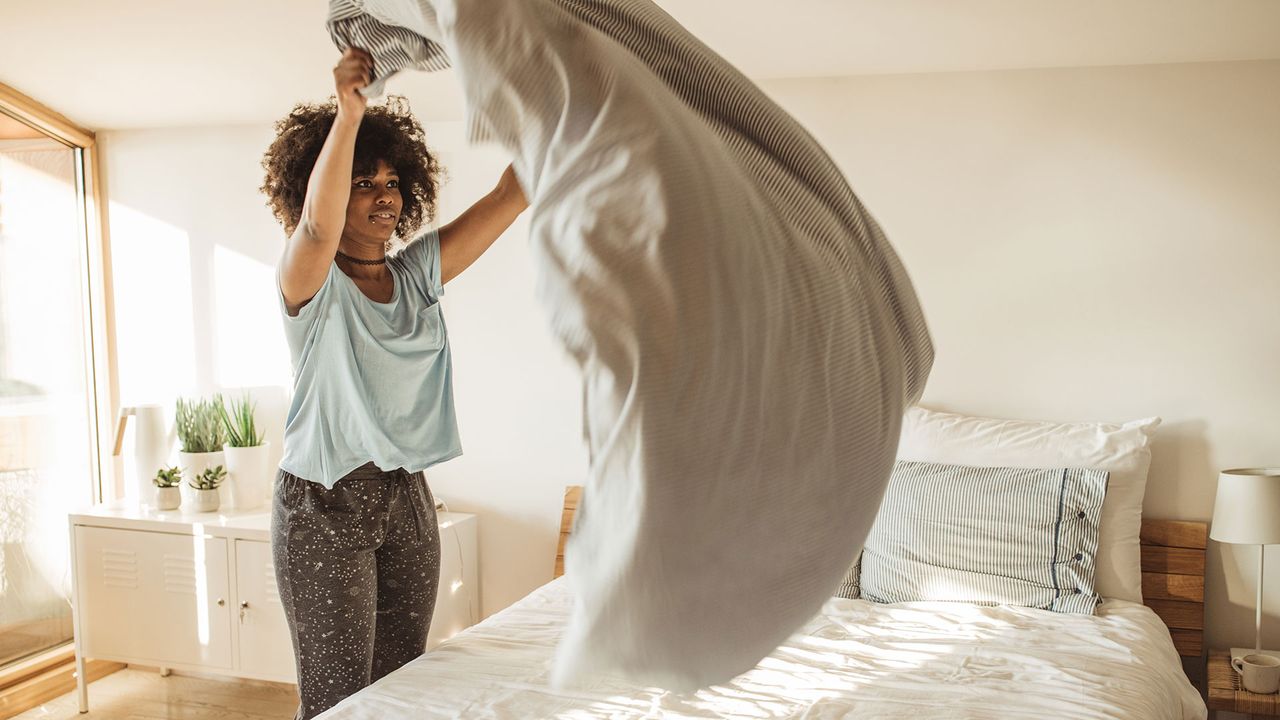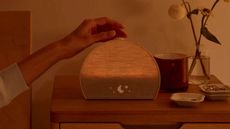Home LivingWellnessSleepHow often should I wash my sheets? More than you’d think…We tackle your bed cleaning questions answered, including how regularly you should be washing your sheets, what temperature you should wash your bedding at, and moreWhen you purchase through links on our site, we may earn an affiliate commission.Here’s how it works.
Home LivingWellnessSleepHow often should I wash my sheets? More than you’d think…We tackle your bed cleaning questions answered, including how regularly you should be washing your sheets, what temperature you should wash your bedding at, and moreWhen you purchase through links on our site, we may earn an affiliate commission.Here’s how it works.
We tackle your bed cleaning questions answered, including how regularly you should be washing your sheets, what temperature you should wash your bedding at, and more
When you purchase through links on our site, we may earn an affiliate commission.Here’s how it works.
(Image credit: Getty)

(Image credit: Getty)
It might seem straightforward, but people have very different opinions on how often you should wash your bedding, what temperature it’s best to wash sheets at, and whether it’s okay to tumble dry your bedding or not. This guide is here to answer all those questions and more.
Before we start, the golden rule is tocheck the care label first, to make sure there aren’t any special washing instructions you need to follow. If there are, obviously, follow these instructions first and foremost. If not, read on for some general rules on how to clean your bedding effectively. If you invest in some of thebest sheets, they’ll be designed to wash well and last a long time.
How often should you wash your bedding?
The general rule is you should wash your bed sheetsonce a week,oronce a fortnight at the longest. That rule goes for all the bits of the bed that are in direct contact with your skin – so, in the UK that’s things like sheets, your duvet cover and pillow cases.
If you’re not sleeping in your bed every night, or if the weather is cooler and you’re not sweating at night, you might be able to stretch to once a fortnight.
If you have pets, and especially if you let those pets sleep in your bed, you should be washing your sheets once every 3-4 days. If you suffer from seasonal allergy flare-ups, you might also want to wash your sheets more than once a week during the summer months, and ditto if you find yourself sweatier than usual in hot weather.
Why do you need to wash your sheets so often? Well, if you spend 8 hours a night in bed, that’s 56 hours a week. Which is plenty of time for dirt, dead skin cells, sweat, body oils, and dust mites to build up. (For context, consider how many hours you’d typically wear a piece of clothing like a shirt or top for before washing it.)
While sleeping in a bed full of old sweat isn’t hugely appealing, it’s the dust mites that will perhaps cause the most problems the quickest. Dust mites (or, often, their droppings) can lead to skin irritation and allergy flare ups. Washing your bedding is a keyway to get rid of dust mites.
Sign up to the T3 newsletter for smarter living straight to your inbox
Get all the latest news, reviews, deals and buying guides on gorgeous tech, home and active products from the T3 experts
What temperature should you wash sheets at?
Ideally, you should wash your sheets at at least60C (140F). This is the temperature required to kill dust mites and bacteria. In the US, check your machine’s settings – a hot wash is typically 130 degrees Fahrenheit or above.
Washing at lower temperatures is more environmentally friendly, but won’t clean as effectively. Below 60C, the wash might dissolve the dust mite droppings that cause most people’s allergies, but it won’t kill the mites themselves, so it’s only a temporary solution.
How about the rest of the bed?
We’ve established you should aim to should wash your sheets once a week. But what about the rest of your bedding? It’s less often, you’ll be pleased to hear, but don’t forget about it altogether.
Pillowsshould be washed once every 4-6 months, provided you’ve chosen a pillow type that is washable (check the care label, this isn’t true of all pillows). Here’show to clean a pillow.
Blanketsandthrowsshould be washed once every 2-3 months.
Yourmattressshould be cleaned once every 6 months or so. Here’show to clean a mattress(andhow to clean a memory foam mattress, specifically). Properly cleaning a mattress isn’t especially easy, so a couple of preventative measures you can take that will help are to vacuum your mattress regularly to bring up the surface layer of dust, and add a protector, which can be washed much more easily than a mattress can. Consult ourbest mattress protectorguide for our top recommendations.
Do I need to wash new bedding?
Yes, you should probably wash new sheets before sleeping in them. Packaged sheets may still have the chemical remnants from the manufacturing process on them – including, mainly, a starch known as ‘sizing’, which is used to keep them smooth. This can make them feel scratchy and, in some people, cause skin irritation. If you don’t have sensitive skin, you’ll probably get away with not washing your new sheets before sticking them on your bed, though.
How should I dry my bed sheets?
If the weather is fine, and you have space to do so, line drying your bedding is a great option. It’s kinder on the fabric fibres than tumble drying, so could help your sheets last longer, and the sun’s UV rays can help kill lingering bacteria. It’s also free and eco-friendly.
If it’s rainy or you’re short on space, provided the care label says your sheets are suitable for tumble drying, this is another option. However, make sure you use thelow heat setting. A high heat can damage the fibres in your bedding, including the damage the elastic if you have fitted sheets. A low heat setting help reduce creasing. Avoid tumble dryer sheets, too.

Samsung Galaxy S25: every leak, rumour and spec we’ve heard before the launch eventThis is everything we’ve heard about the new handsets
This is everything we’ve heard about the new handsets

This case turns your iPhone or Android phone into an e-reader, but there’s a catchActually, there are a couple…
Actually, there are a couple…

Waking up for work is tough in the winter – but smart tech can help you avoid that snooze buttonHow smart tech makes winter mornings run smoother
How smart tech makes winter mornings run smoother

Nutritionist reveals 3 foods you should eat before bed to stay warmStruggling to stay warm during the night? Try eating some of these
Struggling to stay warm during the night? Try eating some of these

Are headbands the new sleep technology trend?

Hatch’s latest sunrise alarm clock finally has a phone-free design – and I’m obsessedHatch launches the Restore 3 wake-up light and it could drastically improve your mornings
Hatch launches the Restore 3 wake-up light and it could drastically improve your mornings

This ERA mattress topper can turn your mattress into a smart sleep tracking deviceThe ERA Smart Layer is my favourite wellness product from CES 2025
The ERA Smart Layer is my favourite wellness product from CES 2025

Withings’ smart mirror combines a smartwatch and scales into a full-length health scannerWithings debuts new conceptual smart health mirror at CES 2025
Withings debuts new conceptual smart health mirror at CES 2025

6 gadgets to get you through Dry JanuaryWith Christmas and New Year out of the way, we take a look at some of the best gadgets to use for Dry January
With Christmas and New Year out of the way, we take a look at some of the best gadgets to use for Dry January

This pillow flip sleep hack can help you beat Christmas insomnia – and it takes secondsIf you love the cold side of the pillow, you’ll love this quick sleep hack
If you love the cold side of the pillow, you’ll love this quick sleep hack